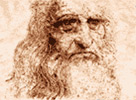Leonardo Da Vinci: Angel or Antichrist
 Italian professor Alessandro Vezzosi is certain of the fact that numerous inventions of Leonardo Da Vinci required plastic.
Italian professor Alessandro Vezzosi is certain of the fact that numerous inventions of Leonardo Da Vinci required plastic.
The professor claims that he discovered recipes of the Florentine genius containing detailed descriptions of artificial man-made materials.
Vezzosi examined Da Vinci's manuscripts in several libraries in Britain, Italy and France. In the end, he discovered descriptions of mixtures resembling modern day plastics. The notes also included pictures.
According to professor, Da Vinci used animal and vegetable glues, at times adding organic fibers, cabbage leafs, salad and paper. In addition, Da Vinci synthesized a particular chemical similar to acetone. Following Leonardo's detailed manual, Vizzosi came up with something similar to bakelite cement (plastics of the early 1900s).
PS. Leonardo Da Vinci was an unusual man. He used to be referred to as Sorcerer, Wizard, Angel, and Antichrist. Nobody remained indifferent towards his persona. People either loved or hated Da Vinci. He remains a mystery for contemporaries even today.
In one of his diaries Leonardo Da Vinci recorded an interesting parable. A man was once told to get up because the sun has already been shining. The man replied, “If I needed to travel the same distance and do as many tasks as the sun, I would have woken up long time ago. However, I don’t have a long way to travel and therefore I do not want to get up.” Strangely, centuries later, Leonardo himself will be referred to as someone who has awoken too soon for his epoch.
Magnificent and ecstatic Renaissance, mesmerized by beauty and perfection, remained absolutely indifferent to Leonardo's revolutionary inventions. Many of his contemporaries noted that master Leonardo wasted too much time on useless inventions, instead of fully concentrating on painting. They were even more distressed by the master's constant experiments with colors. Da Vinci's “The Last Supper” for instance, which the master decided to paint with oil paints, started to fade and crack in Leonardo’s living years. He could never devote himself to one task. Therefore, it took ages for him to complete his orders.
Leonardo was interested in everything that surrounded him. Among an entire array of interests, there was one Da Vinci was rather proud of. He was fond of “creating” stenches. Here is an excerpt from his diary. “If you want to create fabulous stench, take human fecal matters, smelly goose-foot, or cabbage. Place all of these ingredients in a can. Seal tightly. Store the can buried in manure for three months. You may then open the can…”. Such absurd idea can only be fully understood in a special context. Da Vinci offered this method as a way to fight wars.
According to Giorgio Vazari, “Leonardo was magnificent and Godly. Son of Piero from Vinci; he could have reached amazing heights in science and literature, if only he wasn't so multitalented and inconsistent.”
Leonardo Da Vinci studied many subjects. However, he did not have enough patience to master them fully. Da Vinci’s persona remained a mystery for many of his contemporaries. Nobody could fully perceive his identity. Maestro did not consume meat and slept only for 15 minutes every four hours. He was left-handed, which at the time was interpreted as an evil sign. In addition, Da Vinci used to write in a mirror reflection. He was often seen by gibbets sketching dead bodies trying to capture every single detail. The genius used to invite invalids, ugly, monstrously looking individuals to his house and sketch them. Was he a pervert or was he merely conducting another study? Low class people considered the master to be a heartless tyrant. A strange man with a beautiful face and sophisticated manners made people of low class tremble with fear. He was considered to be a sorcerer who played games with the Devil.
Some of Leonardo's inventions amazed representatives of the upper class. His intention to design a flying apparatus seemed absurd at the time. Leonardo's eagerness and aspiration to penetrate into the unknown and examine the limits of man's conscious scared people away.
“Only solitude provides the necessary freedom.” These words can be found quite often in Leonardo’s diaries. And if we are to believe his contemporaries, the artist was absolutely free. He did not have close friends, never had lovers, rarely communicated with his relatives. He was not a patriot and could easily develop weapons for both parties involved in a fight.
Nobody understood Leonardo, yet people could not refrain from admiring his talents either.
Today's perceptions of Leonardo Da Vinci do not differ much from those of XV-XVI centuries. We still do not know who he really was. Leonardo devoted his diaries to observations, research, predictions, to anything but himself. Not all of the maestro's diaries survived. They were either lost or purposely hidden. This is just another mystery associated with the name of Leonardo Da Vinci.
Source: Around the World, Membrana
Subscribe to Pravda.Ru Telegram channel, Facebook, RSS!




